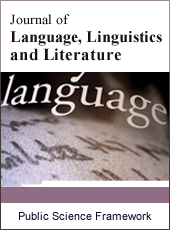Journal of Language, Linguistics and Literature
Articles Information
Journal of Language, Linguistics and Literature, Vol.2, No.4, Aug. 2016, Pub. Date: Aug. 16, 2016
Causes of Code Switching by Low Level EFL Learners at Jazan University, Saudi Arabia: A Teachers’ Perspective
Pages: 24-31 Views: 3726 Downloads: 4725
[01]
Naif Masrahi, English Language Centre, Jazan University, Jazan, Saudi Arabia.
This paper reports on the quantitative research carried out to explore the causes of Code Switching by Low Level EFL learners at Jazan University, Saudi Arabia. Code switching is a frequently observed phenomenon in a bilingual or multilingual environment and language learners often turn to their native tongue in a foreign language classroom. Code switching has been observed in both teachers and students’ discourse. Though code switching has not been much encouraged by the linguists but considered a favourable tool if language learners are failed to accommodate with the barriers of the target language. This paper employs questionnaire technique to collect the data regarding the issue through teachers’ perspective. The sample consists of 29 participants; all of them are highly qualified EFL teachers at Jazan University from multilingual backgrounds and diverse nationalities. The results demonstrate that students switch code on account of multiple reasons including learning and social factors. Nevertheless, code switching facilitates learners when they lack lexical or syntactical knowledge, The English Language Centre of Jazan University needs to devise a strategy to minimise it to the least possible level.
Sociolinguistics, Code Switching, L1
[01]
Ahmad, Badrul and Kamaruzaman Jusoff. “Teachers’ Code-Switching in Classroom Instruction for Low English Proficient Learners.” Canadian Journal for Science 2 (2009): 49-55. Print.
[02]
Cheng, Xiaoli. “Research on Chinese College English Teachers’ Classroom Code-switching: Beliefs and Attitudes.” Journal of Language Teaching and Research 4.6 (2013): 1277-1284. Web. 29 Jan. 2014.
[03]
Gysels, Marjolein. “French in Urban Lubumbashi Swahili: Code-Switching, Borrowing or both?” Journal of Multilingual and Multicultural Development 13 (1992): 41-56. Web. 27 Jan. 2014.
[04]
Hegde, Medha, et al. "Discourse Functions of Code-Switching Among Normal Kannada-English and Malayalam-English Bilinguals: A Pilot Study." Asia Pacific Journal of Speech, Language and Hearing 14.4 (2011): 211-216. Web. 29 Jan. 2014.
[05]
Moghadam, Soodeh, et al. "Code Switching as a Medium of Instruction in an EFl Classroom." Theory and Practice in Language Studies 2.11 (2012): 2219-2225. Web. 26 Jan. 2014.
[06]
Nava, Guadalupe, et al. "Exploring International College Students' Use of Code Switching: Social and Academic Effects." Journal of Intercultural Disciplines 8 (2008): 130+. Web. 30 Jan. 2014.
[07]
Poplack, Shana. “Sometimes I'll start a sentence in Spanish y termino en Espanol: Toward a Typology of Code-switching.” Linguistics 18 (1980): 581-618. Web. 15 Feb. 2014.
[08]
Sert, Oclay. “The Function of Code Switching in ELT Classroom.” The Internet TESL Journal 11 (2005): n.pag. Web. 15 March. 2014.
[09]
Skiba, Richard. “Code Switching as a Countenance of Language Interference.” The Internet TESL Journal 10 (1997): n.pag. Web. 13 March. 2014.
[10]
Hughes, Claire E., at al. “Code Switching Among Bilingual and Limited English Proficient Students: Possible Indicators of Giftedness.” Journal for the Education of the Gifted 30.1(2006): 7-28. Web. 28 June. 2016.
[11]
Eldin, Ahmad. “Socio Linguistic Study of Code Switching of the Arabic Language Speakers on Social Networking.” International Journal of English Linguistics 4.6 (2014): 78-86. Web. 28 June. 2016.
[12]
Al Hourani, Alaa, and Dr. Tun Nur Afizah. “Code Switching in Daily Conversation.” International Journal of Social Science and Humanities Research (IJSSHR) 1.1 (2013): 40-43. Web. 29 June. 2016.
[13]
Rios, Jacqueline, and Jorge Luis Espinoza Campos. “Code-Switching in the EFL Classroom: Friend or Foe?” Revista De Lenguas Modernas 19 (2013): 375-391. Web. 30 June. 2016.
[14]
Alkhresheh, Mutaza. “Code-Switching and Mixing of English and Arabic amongst Arab Students at Aligarh Muslim University in India.” International Journal of Scientific and Research Publications 5.1 (2015): 1-4. Web. 30 June. 2016.
[15]
Abad, Lourdes S. “An Analysis of Teachers’ and Students’ Perception of Codes-witching in Teaching Science and Mathematics in a Philippine Private High School.” The Journal of Asia TEFL 7.1 (2010): 239-264. Web. 30 June. 2016.
[16]
Modupeola, Olagunju. “Code-Switching as a Teaching Strategy: Implication for English Language Teaching and Learning in a Multilingual Society.” IOSR Journal of Humanities and Social Science 14.3 (2013): 92-94. Web. 3 July. 2016.
[17]
Sen, Y. (2010). ‘L1 Use in English as a Foreign Language Classrooms in Turkey’ Abant? zzet Baysal üniversitesi Dergisi. 10 (2), 161-171.

ISSN Print: 2381-7054
ISSN Online: 2381-7062
Current Issue:
Vol. 6, Issue 1, March Submit a Manuscript Join Editorial Board Join Reviewer Team
ISSN Online: 2381-7062
Current Issue:
Vol. 6, Issue 1, March Submit a Manuscript Join Editorial Board Join Reviewer Team
| About This Journal |
| All Issues |
| Open Access |
| Indexing |
| Payment Information |
| Author Guidelines |
| Review Process |
| Publication Ethics |
| Editorial Board |
| Peer Reviewers |


